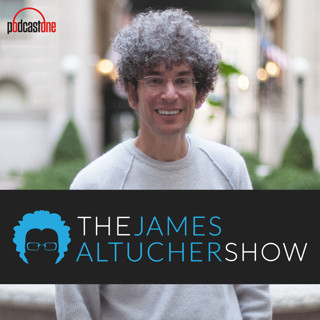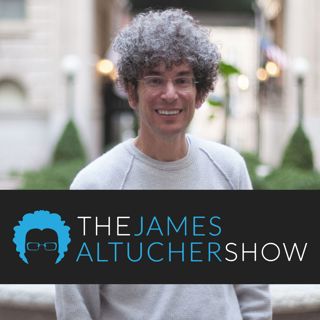
From Deep Blue to Bittensor — Why Subnets Are the Next Internet Boom
A Note from JamesI’ve been on and off writing. From 2004 to 2021, I wrote one to two books a year, without fail. Since then, nothing. But I’ve been working on an idea: obsession. When I’m not obsessed, I can’t do much—sometimes not even the basics. But when I am obsessed, I can turn that energy into real outcomes: a business, a book, a skill, sometimes success, sometimes failure.This episode comes from a recent conversation I had with the Ventura Labs team. We talked about obsession, but also about AI, crypto, and how those obsessions have led to building TAO Synergies ($TAOX), a public company on Nasdaq. I’d love to hear your thoughts: should I write this as a book? Reach out on Twitter or anywhere.Episode DescriptionJames Altucher joins the Ventura Labs Podcast to explore the link between obsession, creativity, and execution. From contributing to IBM’s Deep Blue in the 90s to co-founding TAO Synergies, James shares how obsessions with chess, AI, and crypto have shaped his life and career.The conversation covers the philosophy behind decentralized AI, the rise of treasury strategies, and why writing down ten ideas a day can change everything. This episode isn’t about trends—it’s about frameworks: how to spot real opportunities, how to build around them, and how to know when obsession is worth pursuing.What You’ll LearnWhy obsession can be both a weakness and a superpower—and how to channel it productively.How Bittensor ($TAO) creates decentralized AI opportunities at a fraction of traditional costs.The mechanics of treasury companies and how TAO Synergies is building its playbook.The risks and rewards of subnet investing, and how tokenomics actually drive value.Lessons James learned from failure, from HBO web series experiments to company collapses, and why generating ideas daily can reset your career.Timestamped Chapters02:15 – Introduction02:58 – What is Bittensor06:24 – AI background and Deep Blue09:34 – Chess interest and journey11:46 – $TAOX inspirations and getting TAO-pilled14:09 – TAO Synergies origin story16:57 – Reaching 100M and playbook19:41 – Treasury strategies and validators22:02 – Launching TAO Daily25:51 – Bitcoin adoption and involvement29:32 – Subnet investing and analysis30:59 – Token warnings and TAO demand35:46 – Subnet proposals and increases37:36 – Successful sectors and examples40:04 – Yanez and Metanova43:17 – Decentralization benefits46:13 – AI jobs and countering fears49:34 – Beneficial sectors: AI and stablecoins53:59 – Bryan Johnson documentary55:17 – Starting podcast and interviews57:14 – Interests and obsessions01:00:56 – Daily writing obsession and origins01:03:47 – Confidence and opinions01:07:33 – Company failures and lessons01:10:42 – HBO series and 3AM show01:14:26 – Hesitancy, regrets, pivotal points01:17:38 – Advice on time and experimentsAdditional ResourcesTAO Synergies: @TAOSynergiesTAO Daily (community news hub): taodaily.ioNaval Ravikant – AngelList founder and Bitcoin advocateVentura Labs Podcast (YouTube): @VenturaLabsPodcastSee Privacy Policy at https://art19.com/privacy and California Privacy Notice at https://art19.com/privacy#do-not-sell-my-info.
9 Sep 1h 27min

Rick Harrison: The Pawn Business, Hidden Histories, and the Best Model in Banking
A Note from JamesThe man, the myth, the legend—Rick Harrison. You know him as the star of Pawn Stars, the reality show based on the Gold & Silver Pawn Shop in Las Vegas. The show has been running for over 21 seasons, and Rick himself has become the godfather of the pawn business.I even joined Rick and Chumlee on their own podcast, Pawn After Dark, which was a blast. On this episode, Rick shares the ins and outs of the pawn world—why he thinks it’s the best business model ever, how it’s really the oldest form of banking, and why every object in his shop is more than just an item—it’s a story.Episode DescriptionRick Harrison didn’t just create one of the most successful reality shows of all time—he’s spent decades running the world’s most famous pawn shop. In this episode, Rick and James explore why pawn shops have been a cornerstone of finance for centuries, how collectibles get their value, and why storytelling is the real currency behind every object.From Rolex watches to cowboy hats with mobster histories, Rick breaks down how he decides what’s valuable, how emotions shape the market, and why gold has remained the ultimate store of value for over 6,000 years.What You’ll LearnWhy the pawn business is “the oldest form of banking” and how it still thrives today.How items gain value not just from material, but from the stories attached to them.Why so many Americans rely on pawn shops over banks and payday lenders.The economics of Rolex watches, diamonds, and gold in the pawn industry.How Pawn Stars became a global hit and what keeps the show fresh after 750+ episodes.Timestamped Chapters[01:00] A Note from James: introducing Rick Harrison[02:00] The legacy of Pawn Stars and 21 seasons on TV[04:15] Why Rick still loves his job after 750 episodes[05:30] Every object is a story: the cowboy hat with a mob connection[06:15] Pawn shops as the oldest form of banking[07:20] Why millions of Americans rely on pawn shops instead of banks[09:15] Rolexes, lawyers, and quiet transactions[10:30] How Rick values collectibles, art, and gold[11:45] Diamonds, divorces, and why jewelry stores buy from pawn shops[13:10] Charlie Chaplin’s pawn shop comedy and the stigma shift[14:00] Lab-grown diamonds, fakes, and what people really want[15:30] The emotions (and fights) inside pawn shops[17:10] Silverware, grandma’s heirlooms, and misplaced expectations[18:30] When sentiment meets market value[20:00] The most expensive items Rick has for sale[21:15] Civil War coins, rare history, and collectors’ obsessions[22:30] How U.S. money once carried fine art[23:00] Gold vs. silver: why gold endures as the ultimate store of value[24:15] The making of Pawn Stars and its runaway success[25:15] Why the show works: family-friendly, educational, and fun[26:00] Rick on Chumlee, drama, and why the show will keep goingAdditional ResourcesPawn Stars on History Channel – Pawn Stars Official SitePawn After Dark (Rick’s podcast) – Pawn After DarkGold & Silver Pawn Shop (Las Vegas) – gspawn.comCharlie Chaplin’s The PawnshopSee Privacy Policy at https://art19.com/privacy and California Privacy Notice at https://art19.com/privacy#do-not-sell-my-info.
4 Sep 31min

From Zero to World-Class: Tristan de Montebello on the Art of Public Speaking
A Note from JamesI’m honored to have today’s guest: Tristan de Montebello, a finalist in the World Championship of Public Speaking. He also co-founded UltraSpeaking (ultraspeaking.com/james), where he teaches techniques to improve communication through games and real-world practice. We even played some of those games during this episode, and they surprised me with how much they revealed about my own speaking.Public speaking isn’t just about giving a good talk—it’s about understanding who you are, what you stand for, and how you connect with others. I’ve been speaking for more than 25 years, but I’m still always looking for ways to improve. At the end of the day, sharing ideas—through writing, storytelling, or speaking—is how you can change the world.This conversation with Tristan is fascinating because he’s gone from zero experience to becoming one of the best in the world, all while reverse-engineering what it takes to truly connect with an audience.Episode DescriptionHow does someone go from a complete beginner to a world-class speaker in less than a year? Tristan de Montebello did exactly that—and in the process, he uncovered the strategies, mindsets, and training methods that make communication powerful.In this episode, James and Tristan break down the mechanics of storytelling, humor, vulnerability, and flow in speaking. They explore why audiences respond the way they do, how to use analogies to create connection, and why mindset is the foundation of every great communicator. Whether you’re on a stage, in a meeting, or simply trying to share an idea with friends, these lessons will change the way you approach communication.What You’ll LearnHow Tristan went from novice to World Championship finalist in under a year.Why humor and vulnerability are essential ingredients for authentic connection.Practical ways to use storytelling and analogies to make ideas stick.How to handle insecurity, fumbles, and “tough audiences” without breaking flow.Why mindset—not technique—is the foundation of great communication.Timestamped Chapters[01:00] A Note from James and introducing Tristan de Montebello[04:15] Inside the World Championship of Public Speaking[07:45] Humor, storytelling, and why connection matters[11:10] The Fear Olympics: lessons from Tristan’s grandmother[16:30] “Never be the hero of your own story”[20:15] Breaking down stories like Finding Nemo[24:45] How Tristan trained humor like a stand-up comic[28:30] What great speakers and clowns have in common [33:20] Managing insecurities and staying in character[41:40] From finalist to struggling in an online mastermind[50:20] Slacklining as a metaphor for learning[54:10] Building analogies as a core communication skill [60:30] Reading tough or quiet audiences[67:15] Handling bias and building trust with skeptical crowds[69:45] Flow state in public speakingAdditional ResourcesUltraSpeaking – ultraspeaking.com/jamesToastmasters International – toastmasters.orgRich Dad Poor Dad by Robert Kiyosaki – Amazon linkEight Mile (film referenced by James & Tristan) – IMDbSee Privacy Policy at https://art19.com/privacy and California Privacy Notice at https://art19.com/privacy#do-not-sell-my-info.
29 Aug 1h 56min

Astro Teller on Moonshots, Self-Driving Cars, and the Future of Innovation
A Note from JamesWhat does it take to make a discovery that changes the world? Think about landing on the moon — a true moonshot. Along the way, countless technologies were invented that reshaped life back on Earth.My guest today, Astro Teller, has been part of that same kind of world-changing work. At X — Alphabet’s Moonshot Factory — he’s led projects that gave us self-driving cars, Google Brain, drone delivery, augmented reality with Google Glass, and much more. We even talk about quantum computing, drones that bring your groceries to your backyard, and the mindset it takes to believe in something that once sounded like science fiction.Astro and I first crossed paths when I visited Google X back in 2012 or 2013. He was on this podcast in 2015, and now, ten years later, he’s back to talk about his own show — The Moonshot Podcast — and the latest bold projects that could shape our future.Episode DescriptionAstro Teller, Captain of Moonshots at Alphabet’s X, joins James to share how impossible-sounding ideas become real. From Waymo’s self-driving cars to Wing’s drones, from the birth of Google Brain to breakthroughs in quantum networking and modernizing electric grids, Astro explains the engineering mindset that drives innovation.This episode goes beyond technology — it’s about how to think like a moonshot maker. You’ll hear how X chooses projects, why systems engineering often matters more than pure science, and how to break down massive problems into solvable steps.What You’ll LearnThe three elements that define a true moonshot at X.Why self-driving cars succeeded not because of new science, but because of paradigm-shifting systems engineering.How Google Brain kickstarted the modern AI revolution by betting on scale when neural nets were out of fashion.Why Wing’s drone delivery service may soon feel as ordinary as rideshare apps.How Project Tapestry is mapping and optimizing the electric grid to cut connection times from years to days.The promise (and risks) of quantum networking, quantum sensing, and the looming “Q-Day” when current cryptography could break.Why empathy is crucial for workers displaced by new technologies.Timestamped Chapters[01:00] A Note from James[04:00] Inside Alphabet’s Moonshot Factory (X)[06:00] Defining moonshots: problem, radical solution, breakthrough tech[08:00] Waymo and the hidden challenges of self-driving cars[13:00] Safety, comfort, and the “body language” of cars[17:00] Google Brain and the rebirth of neural networks[20:00] Cats, YouTube, and AI’s first big proof point[23:00] Wing: drones delivering groceries like magic[29:00] Moonshot mindset vs. the Apollo mission[31:00] How X evaluates and selects moonshots[34:00] Breakthroughs behind Waymo and simulation at scale[39:00] What if every car was autonomous?[40:00] Project Tapestry: modernizing the electric grid[45:00] Mapping PJM and national-scale grids[46:00] Lessons from Google Glass: too early, or misframed?[48:00] The future of AR glasses and AI assistants[51:00] Why X left longevity research to Calico and Verily[52:00] Quantum computing, networking, and sensing explained[57:00] The coming “Q-Day” and what it means for security[59:00] AI, jobs, and the importance of empathy[61:00] Closing thoughts and Astro’s Moonshot PodcastAdditional ResourcesThe Moonshot Podcast with Astro Teller (YouTube)X, the Moonshot FactoryWaymo (Self-Driving Cars)Wing (Drone Delivery)Google BrainProject Tapestry – Grid ModernizationPJM Interconnection (Eastern US Grid)Calico (Alphabet’s Longevity Research)Verily Life SciencesSandbox AQ (Quantum & AI)Carnegie Mellon University School of Computer ScienceSee Privacy Policy at https://art19.com/privacy and California Privacy Notice at https://art19.com/privacy#do-not-sell-my-info.
27 Aug 1h 2min

Matt Smith: Rethinking College with “The Preparation”
A Note from JamesThere’s always been debate about whether college is worth it. But what if there’s a better alternative—one that actually prepares you to become the person you want to be? My good friend Matt Smith just wrote a book with Doug Casey called The Preparation. It’s not theory—he’s been putting his own son through it as a real-world experiment. Instead of college, Maxim has spent the past two years learning skills like EMT training, firefighting, building houses, working cattle, and even launching a business. This is a practical roadmap for turning those years of 18–22 into a hero’s journey. I loved this conversation, and I’m sending the book to all of my kids.Episode DescriptionJames talks with entrepreneur and writer Matt Smith about his new book The Preparation, co-authored with Doug Casey. The book lays out a four-year alternative to college built around “cycles”—three-month intensive experiences designed to build practical skills, personal codes, and real-world wisdom. From earning an EMT license to fighting wildfires, training in Muay Thai, or running a small business, these cycles are designed to help young people become independent, capable, and resilient. James and Matt discuss why the traditional college path often fails, how to build a personal code of values, and why the future belongs to “expert generalists” who know how to learn across disciplines.What You’ll LearnWhy “be, do, have” is a more powerful framework for life than chasing possessions or credentials.How creating a personal code builds self-respect and identity.Why intergenerational relationships matter more than peer validation.How cycles of hands-on learning—from EMT work to entrepreneurship—prepare young people better than a classroom ever could.Why becoming an expert generalist is the best hedge against a future dominated by AI and automation.Timestamped Chapters[00:00] A Note from James: College vs. alternatives[01:00] Introducing Matt Smith and The Preparation[03:00] Origins of the book and Doug Casey’s vision[05:00] Writing the book for his son Maxim[06:00] Why homeschooling replaced high school[07:00] “Be, Do, Have” explained[09:00] Stacking cycles vs. stacking skills[10:00] Why the book focuses on young men (and how women can adapt it)[11:00] How to build your own cycle[13:00] Why traditional education fails to prepare people for real skills[14:00] Establishing a personal code[16:00] Examples of personal rules for self-respect[18:00] Practicing courage and choosing virtues[20:00] Skills Maxim has gained so far—EMT, chess, horses, firefighting[22:00] Adventures with Doug Casey and small-country nation building[24:00] Maxim’s cycles: EMT work, ranch apprenticeship, wildfire EMT[27:00] Structure, resistance, and learning by doing[28:00] Shelter Institute and learning to build a house[29:00] Entrepreneurship cycle: precision agriculture with drones[31:00] Lessons from entrepreneurship[32:00] Muay Thai training in Thailand[33:00] Cooking school in Florence[34:00] Travel with purpose vs. aimless wandering[36:00] James on biographies and meaningful decisions[37:00] Preparing for AI and the future of work[39:00] Why being an “expert generalist” matters[41:00] Learning how to learn across environments[42:00] The problem with peer-only education[44:00] Intergenerational relationships as mentorship[45:00] What comes after the preparation[47:00] Why the program can work for adults too[49:00] Rethinking retirement as another cycle of preparation[56:00] Matt’s personal growth through writing and learning new skills[58:00] Designing The Preparation as a beautiful, interactive book[59:00] Closing thoughts and sending the book to the next generationAdditional ResourcesMatt Smith & Doug Casey — The PreparationDoug Casey’s Take (Podcast): YouTube ChannelDoug Casey’s Official Site: internationalman.comThe Shelter Institute (Learn to Build a House): shelterinstitute.comMuay Thai Training in Thailand (Example School): Santai Muay Thai GymFlorence Cooking School Example: Apicius International School of HospitalityStripe Press (Books mentioned by Matt): stripe.pressDoug Casey’s Classic Book — Crisis Investing: AmazonSee Privacy Policy at https://art19.com/privacy and California Privacy Notice at https://art19.com/privacy#do-not-sell-my-info.
23 Aug 1h 2min

Case Kenny: Stop “Settling Down” and Start “Settling Up”
Episode DescriptionJames sits down with Case Kenny, author of The Opposite of Settling and host of New Mindset, Who Dis?, to talk about how our expectations around relationships shape the way we date and commit. Case shares the research, stories, and mindset shifts that helped him go from avoiding commitment in his twenties to finding fulfillment in a relationship that amplifies his independence. This episode challenges old narratives about “settling down” and offers a practical framework for building relationships that energize rather than diminish.What You’ll LearnWhy “settling down” is the wrong framework for love—and how to reframe it as “settling up.”How the liking gap skews our perception of how others see us, and what that means for dating.The importance of dating to be seen instead of dating to be liked.Why non-conforming traits (your “weirdness”) can actually make you more attractive.How playfulness and humor serve as the foundation for strong, lasting relationships.Timestamped Chapters[00:00] Rethinking independence in relationships[01:00] James introduces Case Kenny and The Opposite of Settling[02:00] Why the phrase “settle down” shaped Case’s early resistance to commitment[05:00] Letting relationships fade: what Case learned from avoidance[07:00] Meeting Emily and the power of a “slow burn”[09:00] Timing vs. compatibility in finding a partner[11:00] The “liking gap” and how it affects dating behavior[13:00] Performance mode vs. being present[14:00] Dating to be seen, not just to be liked[15:00] The value of non-conforming traits in attraction[17:00] From introversion to self-expression through podcasting[20:00] Knowing yourself before you can know what you want[21:00] The peak-end rule and distorted memories of relationships[23:00] Appreciating past relationships without villainizing them[25:00] How the brain can reinforce unhelpful dating patterns[27:00] The case for showing up fully on first dates[29:00] Learning from rejection and getting clarity fast[31:00] Why regret often comes from the wrong relationship, not from being single[33:00] Playfulness as the true purpose of relationships[35:00] Humor and “bids for connection” as relationship foundations[37:00] The importance of noticing your partner[38:00] Why James listened to standup comedy before dates[39:00] Wrapping up with Case KennyAdditional ResourcesCase Kenny — The Opposite of Settling: PenguinRandomhouse.comCase Kenny — Single Is Your Superpower: New Mindset, Who Dis?New Mindset, Who Dis? (Apple Podcasts): Apple PodcastsThe Gottman Institute — “Bids for Connection” (overview): Start paying more attention to bids. Gottman InstituteResearch — “The Liking Gap” (Boothby et al., 2018, PDF): Yale Clark Relationship Lab. Clark Relationship LabExplainer — Peak–End Rule: The Decision LabCase Kenny on X (Twitter): @thecasekennySee Privacy Policy at https://art19.com/privacy and California Privacy Notice at https://art19.com/privacy#do-not-sell-my-info.
19 Aug 40min

Will Bittensor be Bigger than Bitcoin? | The TAO Pod
Episode Description:Hosted by James Altucher (serial entrepreneur, bestselling author of "Choose Yourself," podcaster, hedge fund manager, chess master, and investor in over 20 companies, with expertise in crypto and AI) and Joseph Jacks (founder and general partner of OSS Capital, the world's first VC firm dedicated to commercial open-source software; early-stage investor in AI and open-source tech, previously Entrepreneur-in-Residence at Quantum Corporation).In the premiere episode, James and Joe explore Bittensor's decentralized AI ecosystem, contrasting it with centralized giants like xAI's Grok 4. They discuss subnets providing GPUs, datasets, and models; proof-of-useful-work mining; building custom AI agents; and Bittensor's potential to outpace Big Tech in achieving superintelligence.Plus, tokenomics, real-world apps, capitalism parallels, and bold predictions on TAO's future value.Key Timestamps & Topics:00:00:00 - Intro: Podcast overview, AI/crypto news (Grok 4, Bitcoin ATH), centralized vs. decentralized AI.00:09:00 - Proof of Useful Work: Mining datasets, models, inference on Bittensor.00:10:00 - Subnet Deep Dives: Dataverse (13) for data scraping; building trading models.00:16:00 - Chutes (64): Cheap AI inference, e.g., Bible chatbot at 1/50th OpenAI cost.00:23:00 - Agentic AI: Building owned agents, avoiding Big Tech biases/control.00:28:00 - Scaling & Future: Decentralization's infinite potential; Bitcoin compute parallels.00:33:00 - Superintelligence Path: Bittensor faster than Elon; energy/chip challenges.00:34:00 - Bittensor's Early Stage: Like 1990s internet, needs better user interfaces.00:38:00 - Chutes Economics: 10T+ tokens served, 4.4K H100 GPUs, user growth.00:50:00 - Valuation & Growth: Subnets as companies; TAO potentially 5-10x Bitcoin.01:02:00 - Bittensor as Pure Capitalism: Incentives for supply/demand; upgrading equity models.01:09:00 - Centralization Risks: Elon/Meta control; Bittensor's global solution.01:13:00 - Wrap-Up: Teasing future episodes on subnets, AI ventures.Key Takeaways:Bittensor incentivizes ~20-100K GPUs permissionlessly, rivaling xAI at zero CapEx.Subnets like Chutes (inference) and Dataverse (data) enable cheap, owned AI models for anyone.Decentralization democratizes AI talent/compute, potentially building AGI faster than centralized efforts.Quote: "Bittensor is the most expressive language of value in the history of languages of value." – Joseph JacksResources & Links:Bittensor Official: bittensor.comTaostats (Explorer/TAO App): taostats.ioSubnet 64 (Chutes): taostats.io/subnets/64Subnet 13 (Dataverse): macrocosmos.ai/sn13Akash Network: akash.networkxAI: x.aiFollow Hosts: @jaltucher & @josephjacks_ on XSubscribe for more on Bittensor subnets, AI building, and crypto trends! Leave a review and share your thoughts. #TheTaoPod #Bittensor #DecentralizedAI #TAOToday's Advertisers:Secure your online data TODAY by visiting ExpressVPN.com/ALTUCHERElevate your workspace with UPLIFT Desk. Go to https://upliftdesk.com/james for a special offer exclusive to our audience.See Privacy Policy at https://art19.com/privacy and California Privacy Notice at https://art19.com/privacy#do-not-sell-my-info.
9 Aug 1h 26min

$100K Scam Story: How to Spot Con Artists with Johnathan Walton's Red Flags
A Note from James:"Anatomy of a Con Artist. The 14 red flags to spot scammers, grifters, and thieves". This is a book—an amazing book—by Johnathan Walton.Check out his podcast Queen of the Con, and his new one Cocaine Air. We talk about both in this episode. But his book, Anatomy of a Con Artist, is just dead on.Johnathan shares how he got conned out of nearly $100,000 by someone posing as an Irish heiress. He breaks down not only that story but others—showing how all these professional con artists use the same tricks. The red flags are universal.And honestly, I’ve felt conned before. Reading this book really opened my eyes. The stories are incredible, and Johnathan’s a fantastic storyteller. You’ll hear it for yourself.Episode Description:James talks with Johnathan Walton—TV producer turned con artist hunter—about the psychology, tactics, and red flags of professional scammers. After being conned out of nearly $100,000 by someone posing as an Irish heiress, Walton went public, brought his scammer to justice, and began investigating other cases.Together, they unpack how emotion—not intellect—is the con artist’s favorite tool, and how even smart, skeptical people can be taken in. Walton explains the 14 red flags every scammer throws up, why victims rarely report what happened, and how shame and silence help cons thrive.Plus: the untold story of Walton’s family losing millions to a Jamaican Ponzi scheme, how Satanists helped him track a fugitive scammer, and why AI will never replace the twisted brilliance of the human con.What You’ll Learn:How professional con artists emotionally manipulate even intelligent peopleThe 14 red flags common to nearly every scamWhy victims often stay silent—and how scammers exploit shameHow “beak-wetting” creates false trust in investment scamsWhy AI can't replicate the improvisational storytelling of real-world con artistsTimestamped Chapters:[00:00] A con artist doesn't outsmart you—they outfeel you[01:00] James introduces Johnathan Walton and his work[02:00] Behind the HBO show “Wahl Street” and producing during COVID[04:00] AI in storytelling: potential and limitations[07:00] Johnathan’s $100K con: the fake Irish heiress and inheritance scam[10:00] Red Flag: TMI—“too much information” and the psychology behind it[14:00] The trap of emotional vulnerability[17:00] How scammers build false intimacy[20:00] Johnathan’s early career and his resilience to shame[24:00] How she drained him slowly: death by a thousand cuts[25:00] The first lie that blew everything open[28:00] Uncovering her global scams and getting her arrested[30:00] Scamming Satanists and extradition to Northern Ireland[32:00] Psychopathy vs. regular criminals: how con artists differ[34:00] Why she targeted him: the do-gooder trap[36:00] Breaking down the red flags from his book[41:00] Ponzi schemes and beak-wetting in his own family[47:00] Wealthy victims who never go public[49:00] The story of NFL QB Eric Kramer and the con-woman wife[52:00] Talking victims out of suicide[53:00] Johnathan’s own mother was conned—by a family friend[55:00] The isolation technique and divide-and-conquer[57:00] How to protect yourself: background checks and gut checks[59:00] Spotting con artists in real life[01:01:00] Cocktail party con: the OnlyFans couple from Arizona[01:02:00] Final thoughts and how to follow Johnathan’s workAdditional Resources with Working Links:Book: Anatomy of a Con Artist by Johnathan Walton Available on Apple Books: Anatomy of a Con Artist Also listed on Penguin Random House: Anatomy of a Con ArtistPodcast: Queen of the Con by Johnathan Walton On Apple Podcasts: Queen of the Con (Apple Podcasts)Podcast: Cocaine Air by Johnathan Walton On Apple Podcasts: Cocaine Air (Apple Podcasts)Movie: Sharper (Neo-noir thriller) streaming on Apple TV+ Watch directly on Apple TV+: Sharper (Apple TV+) About the film and release details: Sharper (Wikipedia page)Today's Advertisers:Secure your online data TODAY by visiting ExpressVPN.com/ALTUCHERElevate your workspace with UPLIFT Desk. Go to https://upliftdesk.com/james for a special offer exclusive to our audience.See Privacy Policy at https://art19.com/privacy and California Privacy Notice at https://art19.com/privacy#do-not-sell-my-info.
7 Aug 1h 17min






















